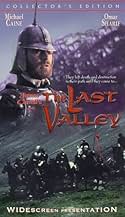Durante la Guerra dei Trent'anni del 1600, una banda di mercenari protestanti convive pacificamente con gli abitanti cattolici tedeschi in un'idilliaca valle di montagna nascosta e incontami... Leggi tuttoDurante la Guerra dei Trent'anni del 1600, una banda di mercenari protestanti convive pacificamente con gli abitanti cattolici tedeschi in un'idilliaca valle di montagna nascosta e incontaminata dalla guerra.Durante la Guerra dei Trent'anni del 1600, una banda di mercenari protestanti convive pacificamente con gli abitanti cattolici tedeschi in un'idilliaca valle di montagna nascosta e incontaminata dalla guerra.
- Inge
- (as Madeline Hinde)
Trama
Lo sapevi?
- QuizPerhaps the most praised element of the production was the score by John Barry, then most famous for his "James Bond" scores. In the new millennium, it was still regarded as one of his best scores. In a project to prepare a special CD release of the soundtrack, it was discovered that the complete original session recordings were either lost or destroyed.
- BlooperDuring the attack in the forest above the valley, a man with an arm injury is being comforted by a fellow soldier. The wounded man is lying against a rock but when an enemy shoots at him in the next frame he is standing as is his friend who was also leaning against the rock in the previous frame.
- Citazioni
The Captain: There is no Hell. Don't you understand? Because there is no God. There never was. Don't you understand? There is no God! It's a legend!
- ConnessioniFeatured in The World According to Smith & Jones: The Tudors (1987)
It is partly the unusual historical context: the story is set during the repeated bloody clashes of Catholic and Protestant armies largely in German-speaking continental Europe in the Thirty Years War of 1618-1648 and reference to a particular battle in a line of dialogue places the period more precisely in late 1643 and early 1644. It is partly the important subjects that it addresses: the narrative is a sharp critique of the role of religion and superstition in fostering hatred and war and the leading character eventually shouts at the local priest: "There is no Hell. Don't you understand? Because there is no God. There never was. Don't you understand? There is no God! It's a legend!".
This British film was written, produced and directed by James Cavell before he became famous for his blockbuster novels. The 17th century village in question was recreated in the valley of Trins in the beautiful Tyrol region of Austria. The Catholic villagers who live there may look rather too clean and well-clothed for the period but the mainly Protestant soldiers who occupy the valley certainly look the part. The music is from John Barry who had made his name with the early James Bond movies.
At the heart of the story is the changing fortunes of the characters as they are subject to competing sources of power: civil authority in the shape of the head villager Gruber (Nigel Davenport), religious dogma provided by the village priest Father Sebastian (Per Oscarsson), military authority imposed by a character known only as The Captain (Michael Caine), and the voice of reason and tolerance offered by the academic refugee Vogel (Omar Sharif). In the course of the story, each will have his moment of triumph but each will suffer grievously in this under- known and under-appreciated film.
- rogerdarlington
- 27 ott 2017
- Permalink
I più visti
- How long is The Last Valley?Powered by Alexa
Dettagli
Botteghino
- Budget
- 11.000.000 USD (previsto)
- Tempo di esecuzione2 ore 5 minuti
- Colore
- Proporzioni
- 2.20 : 1
Contribuisci a questa pagina






































